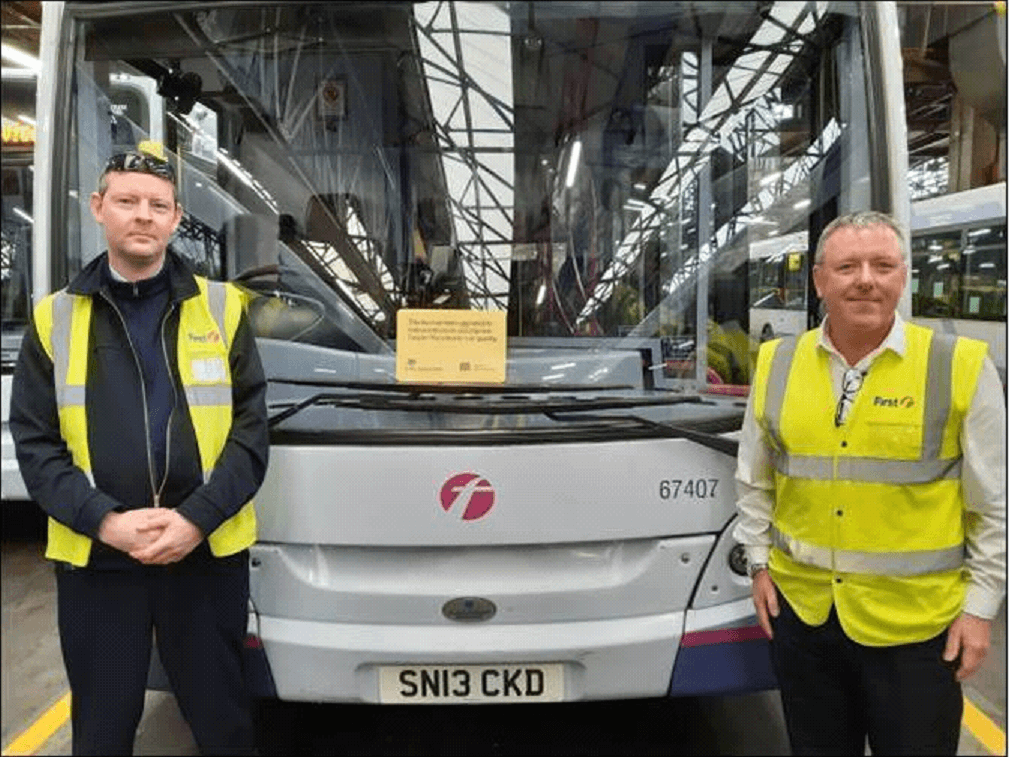A £16m project to retrofit exhaust systems and lower emissions at First Bus has been gaining pace despite the pandemic.
First Bus says it has reached a significant milestone in its air quality retrofit programme, having completed the refit of 1,000 buses across its UK network with new exhaust systems and e-fans to comply with Euro VI emission requirements.
The £16m retrofitting programme has been delivered in partnership with the Joint Air Quality Unit of the Department for Environment, Food and Rural Affairs (Defra) and the Department for Transport (DfT), local authorities, Transport Scotland and suppliers Eminox, HJS and Grayson, and has involved significant financial investment and time commitment from First Bus and government departments.
The project has been completed in just over two years and the 1,000th bus was retrofitted in Manchester. Alongside scheduling challenges due to the Covid-19 pandemic, First Bus said it has worked hard to ensure that operations have continued with limited interruption to customers during the retrofitting programme.
John Dowie, First Bus Strategy Director, said: “We are committed to doing everything we can to make our buses as environmentally friendly as they can be for the communities we serve. We’re proud to have achieved this milestone at the turn of the year, highlighting the ongoing work of our engineering teams. We estimate that each retrofit reduces air pollutants and harmful emissions by up to 95%, and this makes a considerable positive impact to air quality for our towns and cities. Bus services will be a fundamental part of economic recovery as the UK starts to emerge from the pandemic.”
First said that the milestone has been reached at a critical point following its commitment to operate a zero-emission bus fleet by 2035, and its pledge not to purchase any new diesel buses after December 2022. In the past 12 months the operator has introduced several new fleets powered by diesel alternatives including hydrogen-powered, bio-methane-fuelled, and electric buses, but says that retrofit investment is still an important step which ensures the vehicles’ full lifecycles are utilised while reducing emissions. This helps support longer term clean air ambitions.
First Bus has retrofitted 492 single-decker and 508 double-decker buses and the retrofitting programme will continue throughout 2021. This represents approximately 20% of First Bus’ active fleet.
The electric fan (e-fan) cooling system is designed to work only when required, lowering running costs, and environmental impact. The unique configuration ensures that energy is not wasted and First says that fuel savings of up to 10% can be achieved. Retrofitting reduces emissions of NOx and e-fans ensure that this doesn’t increase carbon emissions.
First Bus’s dedication to environmental performance has been bolstered further through the appointment of Jon Tivey as Head of Environment. Jon joins the operator with wide-ranging experience of managing environmental programmes, having previously advised the Olympics and Gatwick Airport. Jon will focus on supporting the operator’s ambitions to deliver best-in-class environmental performance across all areas of its business, working in collaboration with key internal and external stakeholders.
Jon said about the retrofit scheme: “First Bus has been on the trajectory towards a zero-emission bus fleet for a few years and I’ve joined at an exciting time for the business and the industry as we look to decarbonise public transport and significantly contribute to the green recovery. The retrofitting milestone is a great reminder that the environment is an ongoing focus for the business. The retrofitting programme is one way in which we can significantly reduce harmful emissions on our roads. I am particularly looking forward to using my experience in improving performance in all aspects of the environment over the long term, and working closely with colleagues, our supply chain, client/partners, and importantly our customers to achieve our ambitions.”


